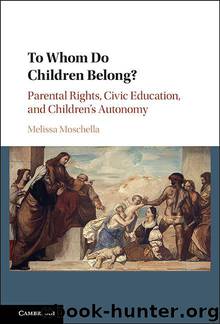To Whom Do Children Belong?: Parental Rights, Civic Education, and Children's Autonomy by Moschella Melissa

Author:Moschella, Melissa [Moschella, Melissa]
Language: eng
Format: azw3
Publisher: Cambridge University Press
Published: 2016-06-01T16:00:00+00:00
Tolerating diverse understandings of citizenship
The controversy over public reasonableness is simply one slice of a larger disagreement over the nature of good citizenship, and more fundamentally, the conditions of justice and legitimacy. There are a wide variety of views, both within and outside of liberalism, regarding the qualities of good citizens and how to foster them. As the public reason debate indicates, the Rawlsian duty of civility or its equivalent holds a prominent place only among Rawlsian liberals, but holds a secondary place or no place at all in others.91 Some views focus more on tolerance and respectfulness of diversity, others on qualities like law-abidingness, honesty or industriousness. Some think active, participatory citizenship is crucial; others consider that more passive forms of citizenship are also acceptable.92
Even where there is agreement on the importance of one particular aspect of citizenship, such as tolerance, such agreement masks even greater disagreement about what that value actually means, and how to go about fostering it. As David Kahane points out:
Depending on one’s understanding of tolerance, there will be quite different stories about the proper boundaries of tolerance; or about whether tolerance entails embracing difference, prescinding from judgment, or simple forbearance when it comes to legal sanctions. Depending upon one’s understanding of toleration, an adequately virtuous citizen may be one who can give a tight-lipped smile to those of different faiths and persuasions; one who enjoys the strangeness of various Others; one who has a positive regard for others regardless of their difference; or one who recognizes her own way of life as contingently constituted by the differences of others. Each of these versions of tolerant citizenship gives rise to its own account of how individuals come by their tolerant characters: an awareness of legal prohibitions and sanctions may be enough; religious teachings may play a role; the prohibition of hate speech might be important, but so might an uncensored public debate over who and what deserves to be tolerated…. People who agree that toleration is a key liberal virtue can disagree on all of these things, and more. Favoring one version of liberal tolerance or one story about how to cultivate it is partisan, not between liberalism and something else but between different forms of liberalism. To the extent that liberals favor letting different ways of life be, they should hesitate to impose some single account of liberal virtues on other liberal citizens.93
Download
This site does not store any files on its server. We only index and link to content provided by other sites. Please contact the content providers to delete copyright contents if any and email us, we'll remove relevant links or contents immediately.
The Art of Coaching Workbook by Elena Aguilar(51165)
Trainspotting by Irvine Welsh(21643)
Twilight of the Idols With the Antichrist and Ecce Homo by Friedrich Nietzsche(18625)
Fangirl by Rainbow Rowell(9229)
Periodization Training for Sports by Tudor Bompa(8254)
Change Your Questions, Change Your Life by Marilee Adams(7761)
This Is How You Lose Her by Junot Diaz(6877)
Asking the Right Questions: A Guide to Critical Thinking by M. Neil Browne & Stuart M. Keeley(5761)
Grit by Angela Duckworth(5605)
Red Sparrow by Jason Matthews(5468)
Paper Towns by Green John(5179)
Room 212 by Kate Stewart(5105)
Ken Follett - World without end by Ken Follett(4723)
Housekeeping by Marilynne Robinson(4436)
The Sports Rules Book by Human Kinetics(4379)
Papillon (English) by Henri Charrière(4263)
Double Down (Diary of a Wimpy Kid Book 11) by Jeff Kinney(4261)
The Motorcycle Diaries by Ernesto Che Guevara(4089)
Exercise Technique Manual for Resistance Training by National Strength & Conditioning Association(4063)
